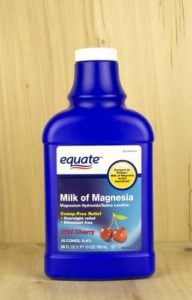The milk of magnesia is a popular over the counter remedy for human indigestion (acidic stomach), and in the right dose it is a remedy for constipation. We use it often, but can you give milk of magnesia for dogs, and is it safe? Let's take a closer look.
If you've been wondering, “can I give my dog milk of magnesia,” the answer is YES – technically, you can give milk of magnesia to dogs and it's not toxic to them. In fact, it often is used with dogs and horses in veterinary practice.
Milk of magnesia is made of Magnesium Hydroxide in a suspension of water. You need to really shake the bottle before opening it for use. Milk of Magnesia has recently been approved for use in animals as well.
Milk of Magnesia is used to help dogs with stomach acid and constipation, the “double duty” action (antacid or constipation) depends on the dose you need to use for the different ailments. You should contact your vet to get the proper dosage.
Dosage of milk of magnesia for dogs:
Administer 1-2 teaspoons (5-10 mL) orally every 4-6 hours (antacid).
Remember to discuss with your veterinarian if the symptoms persist.
Symptoms and Causes of Constipation in Dogs

If your dog is experiencing constipation, one sign is hard stools. There may also be no stool at all with vomiting and strain to “go” but nothing happens. Lack of appetite and a general “miserable” appearance will tell you something is wrong.
There are a few things that may cause constipation:
- Lack of fiber in the diet
- Not getting enough fluids
- Parasites
- Eating things that may block the intestines
- Side effects of a medication the dog is taking
These are all things that can constipate your dog, but other causes are possible.
Constipation that Signals the Need of a Vet
Constipation in dogs may be a sign of serious bowel obstruction that is causing the problem. The symptoms may start out mild, and turn severe. Constipation, acting like they are in pain vomiting not eating or drinking could all mean a very serious problem with your dog’s intestines.
Some dogs eat the worst things, especially as puppies when they are exploring their world. Everything is fair game to them and, like a human baby; almost everything goes in their mouths. Small objects found on the floor or ground, even string has been known to block an intestine.
There may be an underlying illness that you didn’t know about that can also cause it. Unless you are sure of the issue, it is wise to have it checked out with an x-ray. This will usually show a blockage in the intestines, or rule one out. Giving Milk of Magnesia to a dog when the reason is unknown can result in death.
What can you do?
What can you do to aid your dog who's experience constipation? When you see symptoms of constipation in your dog, and you know that constipation isn’t a normal thing:
- Review his diet; is he getting enough fiber in the food?
- How much liquid is he drinking?
- Is he on a medication that may have constipation as a side effect?
- Is this the first time you have seen your dog constipated?
A medication issue needs to be addressed by a vet. What are your dog’s habits when it comes to chewing things? Does he chew and swallow everything he sees, like plastic or rocks outdoors?
This should be checked with an X-ray at the vet’s office rather than just guessing. Because if this is the case, it could be fatal to give your dog Milk of Magnesia. In this case, surgery may be the only option to save your dog. There are also diseases that can affect motility in the intestines. But this only needs to be explored if your dog is frequently constipated.
Remedies before using Milk of Magnesia
There are several things you can do to prevent another bout of constipation in your dog before you give him milk of magnesia. Only when constipation seems to be an infrequent situation. It is better to treat before the dog ends up constipated.
- Check the food ingredients. Notice the fiber content, foods high in fiber help regulate the intestines.
- Add a tablespoon or so of canned pumpkin to their food. It has extra fiber and it is good for them.
- Wheat bran is another supplement that can be used.
- Oat bran or uncooked oatmeal (long cooking kind) this is also a good remedy for anal glands.
- Increase their exercise so they are out playing or walking more (this is good for the owner too)
- Encourage them to drink more liquids if this seems to be a problem. Add wet food to their meals for the liquid content.
- Add psyllium seed to their food in small amounts for bulk in the food
- Mineral oil also works but as with other things here check with your vet for the dosage
- Ginger (the spice) and chicken or beef broth about a half cup
- Coconut oil, good for coat and constipation
- Yogurt plain unsweetened with active cultures a tablespoon a day
- Probiotics in pill or powder (the yogurt is cheaper and better received)
- Bacon fat, a tablespoon a day, a smaller amount for a smaller dog. It is great for their skin too
Before diagnosing it is constipation, your dog should go to the vet to make sure it isn’t something more serious. Milk of Magnesia is usually dosed in small amounts for a mild case of constipation. Calling your vet for proper dosage is the best way to start out. It is given according to body weight, so a 10-pound dog would get a much different dose than a 60-pound dog.
Milk of Magnesia for Dogs
It's approved for animal use by the Federal Food and Drug Administration. Milk of Magnesia is used for larger animals like horses, smaller animals like dogs, and humans.
You can buy it over the counter, meaning you do not need a prescription for it. It is used to treat GERD or gastro esophageal reflux, stomach ulcers and heartburn and constipation. When treating a dog, the dosage is important and the vet can tell you the proper dose for your dog.
Milk of Magnesia Side Effects
This seemingly innocent medication has some side effects that you need to watch for. It may also interfere with other medications that your pet may be taking.
- Diarrhea
- Loss of Appetite
- Electrolytes (due to dehydration from diarrhea)
If using Milk of Magnesia and other antacids long term:
- Causes muscle weakness and thinning of bones
- An overdose can also affect the heart
- It is NOT recommended for dogs with kidney problems
- It is NOT recommended for nursing or pregnant dog
Other Things to Think About
Getting the proper dose for your dog is important to avoid under or over dosing. It is given in very small amounts for a mild case of constipation. Obtaining the right dose from your vet is the best option.
Before treating your dog the vet will have questions for you.
- Is your dog on any medications and what they are?
- What is his diet like?
- How has his behavior been in the past few days?
- Is he a habitual chewer of strange things?
This information will go a long way for helping your vet to diagnose and treat the problem.
Some of the things your vet will do as part of diagnosing chronic constipation:
- Abdominal palpation.
- Neurological exam.
- Complete Blood Count.
- Rectal exam.
- Ultrasound or colonoscopy.
- Barium enema.
- Urinalysis.
You have worked with your vet to determine the cause of chronic constipation. The vet has ruled out a bowel blockage. Changed foods and exercise recommendations. Yet the problem persists, there may be a motility issue in the intestines. There are medications for that you can get from your vet to help get the intestines moving again.
Older Dogs and Milk of Magnesia
Your dog may not have had problems in the past; but as they age, like people, their digestive systems slow down. They might need an assist sometimes. If a vet recommends Milk of Magnesia, he will let you know the dosage by weight and how often you need to dose your dog.
Keep your dog on a good diet with plenty of fiber for their digestive tract. Something like a small amount of canned pumpkin should be accepted by your senior. Some of them can be very picky about what they will eat!
A few Things You Should be Aware of:
Used sparingly, milk of magnesia can help with constipation in dogs. If your dog is on any medications use caution. Aspirin, heart medications, or antibiotics you need to consult the vet. If this is the case, one of the other methods might be better for your dog.
Milk of magnesia can interfere with how other drugs work or nullify them so they don’t work at all. Or your dog could experience:
- internal bleeding
- rectal bleeding
- severe diarrhea
This is why talking to your vet is so important before doing anything with milk of magnesia.
Try the pumpkin or one of the other remedies listed before going the chemical route. Your vet may recommend that as a first thing to do. If you can tell him you tried another remedy with no results; you will have to have your dog examined. Then giving milk of magnesia in the recommended dose.
What is the Best Treatment for Constipation in your Dog?
Natural is always best at first, unless it doesn't work.
The suggestions here should be the first line of defense. Milk of Magnesia should be a last resort for your dog. It is never prescribed for puppies. If a puppy is constipated is it more likely that they chewed and swallowed something.
They may have an intestinal blockage, and a trip to the vet is in order if:
- Your pup is listless
- Refusing food
- Vomiting
- Constipated
- Straining to have a movement
Do not delay if the above symptoms are showing in your puppy. Being curious creatures, they are a lot like human babies. Exploring their environment with their mouths. Swallowing small things are bound to happen but, they won’t always be a problem. You need to be vigilant and buy tough to destroy toys.
When puppy-proofing your home, you need to get down on the pup’s level. This way you can see all the interesting things she might find to test out. Look for things like electrical cords that she may find and get them out of reach. Small items that might be swallowed need to be picked up.
READ NEXT: Mobic for Dogs 101 (Meloxicam/Metacam)













